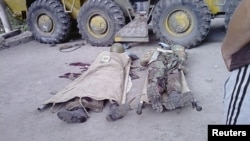Armed militants in Tajikistan who recently fought deadly clashes with security forces have refused to disarm or hand over a former opposition warlord wanted by authorities despite a tense cease-fire.
The Tajik prosecutor-general said Saturday the heavy fighting killed 17 troops, 30 rebels and one civilian in violence that has raised concerns about the stability of the majority Muslim nation. Security sources said authorities have not ruled out a second phase of the military operation.
The clashes in Tajikistan have been on the rise for weeks.
Fighters in the eastern Gorno-Badakhshan autonomous region near the Afghan border are locked in a standoff with the government after President Emomali Rakhmon sent helicopter gunships, armored vehicles and thousands of troops into the area Tuesday, following last week's killing of General Abdullo Nazarov, the regional security chief.
Tajik officials accuse ex-warlord Tolib Ayombekov of orchestrating Nazarov's murder and running an organized crime group that smuggles drugs, tobacco and precious stones over the Afghan border into Tajikistan.
Ayombekov, a rebel leader during the 1992-97 civil war that followed the breakup of the Soviet Union, denies any involvement in Nazarov's death. He told the Associated Press the security operation was aimed solely at rounding up former civil war commanders.
Tens of thousands died in the conflict, in which Rakhman's Moscow-backed troops fought a loosely aligned opposition that included many Islamist fighters.
Fearing possible infiltration by Taliban-linked militants who support Ayombekov, the Tajik government last week closed all border crossings with Afghanistan, only allowing trucks carrying cargo for NATO troops there to pass.
Tajikistan remains the poorest of the ex-Soviet republics. It is important to U.S.-led military operations in Afghanistan and serves as a main transit route for opium destined for Russia and Western Europe. Observers say an eruption of sustained violence there could trigger unrest in neighboring Kyrgyzstan and Uzbekistan, which also are key countries in the Afghan campaign as routes for military supply and withdrawal.
Russia, which still has 6,000 troops stationed in Tajikistan, is worried about instability spreading across Central Asia when the U.S. begins pulling its forces out of Afghanistan in 2014.
Tajikistan's authority in Gorno-Badakhshan - which covers around half the country - is fragile and most of the region's 250,000 inhabitants sided with the opposition in the civil war.
Some information in this report was provided by Reuters, AP and AFP.
The Tajik prosecutor-general said Saturday the heavy fighting killed 17 troops, 30 rebels and one civilian in violence that has raised concerns about the stability of the majority Muslim nation. Security sources said authorities have not ruled out a second phase of the military operation.
The clashes in Tajikistan have been on the rise for weeks.
Fighters in the eastern Gorno-Badakhshan autonomous region near the Afghan border are locked in a standoff with the government after President Emomali Rakhmon sent helicopter gunships, armored vehicles and thousands of troops into the area Tuesday, following last week's killing of General Abdullo Nazarov, the regional security chief.
Tajik officials accuse ex-warlord Tolib Ayombekov of orchestrating Nazarov's murder and running an organized crime group that smuggles drugs, tobacco and precious stones over the Afghan border into Tajikistan.
Ayombekov, a rebel leader during the 1992-97 civil war that followed the breakup of the Soviet Union, denies any involvement in Nazarov's death. He told the Associated Press the security operation was aimed solely at rounding up former civil war commanders.
Tens of thousands died in the conflict, in which Rakhman's Moscow-backed troops fought a loosely aligned opposition that included many Islamist fighters.
Fearing possible infiltration by Taliban-linked militants who support Ayombekov, the Tajik government last week closed all border crossings with Afghanistan, only allowing trucks carrying cargo for NATO troops there to pass.
Tajikistan remains the poorest of the ex-Soviet republics. It is important to U.S.-led military operations in Afghanistan and serves as a main transit route for opium destined for Russia and Western Europe. Observers say an eruption of sustained violence there could trigger unrest in neighboring Kyrgyzstan and Uzbekistan, which also are key countries in the Afghan campaign as routes for military supply and withdrawal.
Russia, which still has 6,000 troops stationed in Tajikistan, is worried about instability spreading across Central Asia when the U.S. begins pulling its forces out of Afghanistan in 2014.
Tajikistan's authority in Gorno-Badakhshan - which covers around half the country - is fragile and most of the region's 250,000 inhabitants sided with the opposition in the civil war.
Some information in this report was provided by Reuters, AP and AFP.





